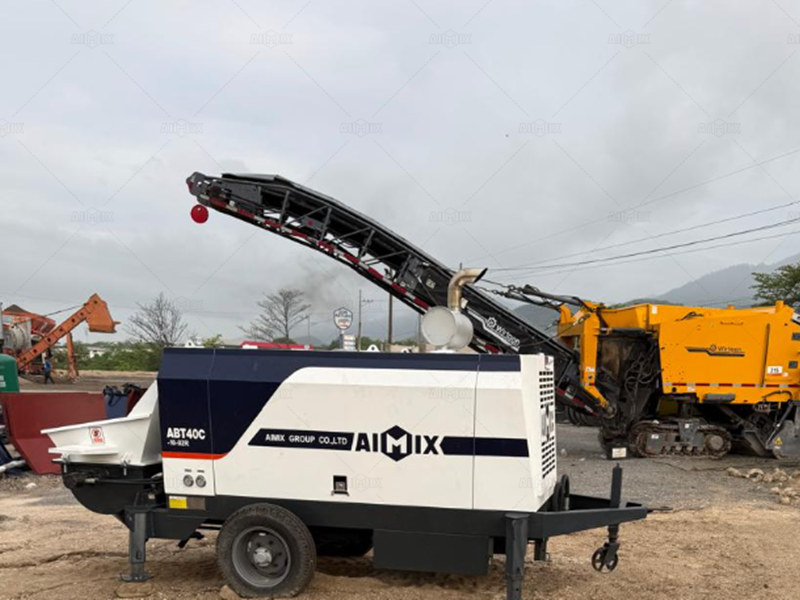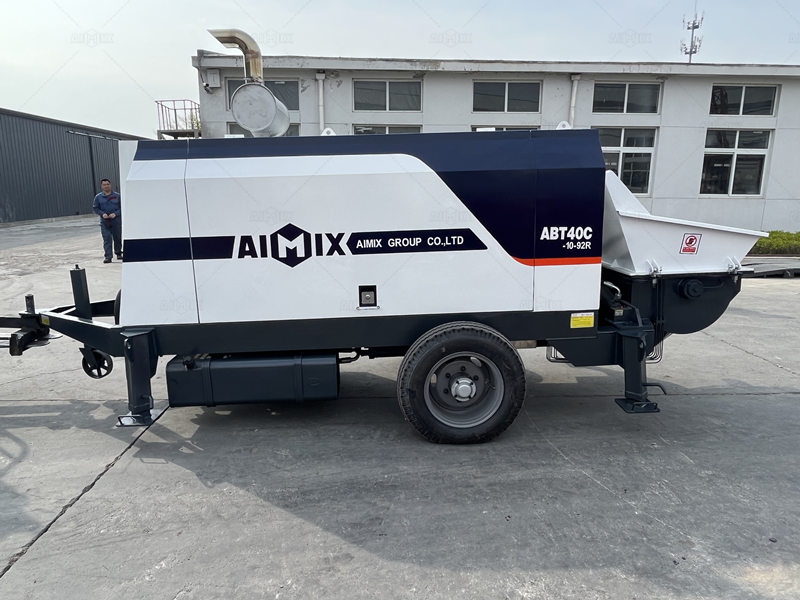The relationship between physical dimensions and pricing strategy represents a fundamental consideration for concrete pumps suppliers when establishing the mini concrete pump price for equipment within this specialized market segment. The compact nature of a small concrete pumping machine directly influences manufacturing costs, material requirements, and production efficiencies that concrete pumps suppliers must carefully balance against performance expectations and market positioning when determining appropriate pricing structures. Unlike their larger counterparts such as the stationary concrete pump designed for high-volume industrial applications, a small concrete pumping machine incorporates deliberate engineering compromises that reduce physical footprint while maintaining functional capability, creating a distinct cost profile that concrete pumps suppliers translate into specific mini concrete pump price points targeted at budget-conscious market segments. The dimensional constraints of a small concrete pumping machine necessitate specialized component sourcing, compact design solutions, and production adaptations that differ significantly from the manufacturing approaches used for larger equipment like the stationary concrete pump, each contributing particular cost implications that informed concrete pumps suppliers incorporate into their mini concrete pump price calculations. Understanding these size-related cost drivers provides valuable insight into the pricing strategies employed by concrete pumps suppliers across the market spectrum, revealing how physical dimensions influence not only manufacturing economics but also market positioning, feature inclusion, and perceived value propositions that collectively determine the final mini concrete pump price presented to potential buyers.

Manufacturing Scale and Production Cost Economics
The production economics for a small concrete pumping machine differ substantially from larger equipment such as a stationary concrete pump, creating distinct cost structures that concrete pumps suppliers must navigate when establishing the mini concrete pump price for compact equipment. The reduced physical dimensions of a small concrete pumping machine naturally require less raw material than larger alternatives, theoretically suggesting lower production costs that should translate to a more accessible mini concrete pump price. However, experienced concrete pumps suppliers understand that this material reduction often coincides with increased manufacturing complexity, as compact designs demand more precise engineering, specialized components, and labor-intensive assembly processes that partially offset the savings from reduced material volumes. The production scale achievable for a small concrete pumping machine also influences the mini concrete pump price, as higher-volume manufacturing typically enables concrete pumps suppliers to distribute fixed costs across more units, potentially creating pricing advantages compared to the lower-volume production common for specialized stationary concrete pump configurations. Additionally, the supply chain considerations differ significantly between equipment categories, with concrete pumps suppliers often establishing different sourcing strategies for the specialized compact components required for a small concrete pumping machine compared to the more standardized parts used in larger stationary concrete pump designs, each with distinct cost implications that influence the final mini concrete pump price. These manufacturing economic factors collectively create a complex calculation for concrete pumps suppliers when determining the appropriate mini concrete pump price that reflects both production realities and market expectations for compact equipment, balancing the apparent cost advantages of reduced size against the hidden expenses of specialized manufacturing approaches required for effective small concrete pumping machine designs.
Component Miniaturization and Specialized Parts Cost
The engineering challenge of creating an effective small concrete pumping machine necessitates component miniaturization and specialized parts that carry significant cost implications which concrete pumps suppliers must incorporate into the mini concrete pump price. Unlike a standard stationary concrete pump that can utilize conventional hydraulic components, engine systems, and structural elements, a genuinely compact small concrete pumping machine requires specifically engineered solutions that maintain performance within severely constrained dimensional parameters. This specialized engineering represents substantial research and development investment that concrete pumps suppliers must recover through the mini concrete pump price, often creating a higher cost-per-capacity ratio compared to larger equipment despite the smaller absolute price. The hydraulic systems in a small concrete pumping machine typically require custom-designed pumps, valves, and cylinders that deliver sufficient pressure and flow within minimal space constraints, components that often carry premium pricing due to their specialized nature and lower production volumes compared to standard hydraulic elements used in stationary concrete pump applications. Similarly, the power plant for a small concrete pumping machine must balance compact dimensions with adequate output, often necessitating specially adapted engines or motors that command higher prices than standardized power units suitable for larger equipment. These component cost differentials explain why astute concrete pumps suppliers establish a mini concrete pump price that may appear disproportionately high relative to equipment capacity, as the engineering sophistication required to create genuinely compact yet functional equipment carries cost premiums that must be reflected in the final pricing structure to maintain sustainable business operations while delivering the performance expectations associated with a small concrete pumping machine.
Performance Capabilities and Feature Integration
The performance specifications achievable within the compact dimensions of a small concrete pumping machine directly influence how concrete pumps suppliers position their products and establish the corresponding mini concrete pump price within competitive market landscapes. Unlike a stationary concrete pump that typically prioritizes maximum output and pressure capabilities above dimensional considerations, a small concrete pumping machine represents a deliberate compromise between physical size and functional performance that concrete pumps suppliers must carefully balance when determining the mini concrete pump price. The output capacity of a small concrete pumping machine naturally falls below that of larger equipment, but sophisticated concrete pumps suppliers understand that simply reducing capacity does not proportionally reduce the mini concrete pump price, as many core components and manufacturing processes maintain similar complexity regardless of ultimate output specifications. The feature integration within a small concrete pumping machine also influences the mini concrete pump price, as compact equipment often incorporates technological innovations such as advanced control systems, safety features, and operational aids that enhance usability despite size constraints, adding cost components that must be reflected in the final price. Additionally, concrete pumps suppliers recognize that the value proposition of a small concrete pumping machine extends beyond simple performance metrics to encompass operational flexibility, accessibility advantages, and mobility benefits that justify premium positioning within the mini concrete pump price structure despite lower absolute capacity compared to larger alternatives like the stationary concrete pump. This performance-based pricing approach explains why the mini concrete pump price from reputable concrete pumps suppliers often incorporates significant value beyond simple concrete placement capacity, reflecting the sophisticated engineering required to deliver functional performance within severely constrained physical dimensions that define the small concrete pumping machine category.

Market Positioning and Competitive Landscape Analysis
The strategic market positioning of a small concrete pumping machine within the broader concrete equipment spectrum significantly influences how concrete pumps suppliers establish the mini concrete pump price to maximize competitiveness while maintaining sustainable profit margins. Concrete pumps suppliers carefully analyze the competitive landscape when determining the mini concrete pump price, positioning compact equipment as accessible alternatives to larger systems like the stationary concrete pump while maintaining sufficient price differentiation to reflect the distinct value propositions of each equipment category. The mini concrete pump price typically occupies a specific market segment that appeals to contractors and businesses requiring concrete placement capabilities without the financial commitment or operational requirements of larger equipment, creating pricing pressure that concrete pumps suppliers must balance against their production costs and business objectives. Within this competitive context, established concrete pumps suppliers often employ tiered pricing strategies for their small concrete pumping machine offerings, creating product variations with different feature sets and performance capabilities that justify corresponding mini concrete pump price differentials while addressing diverse customer requirements and budget constraints. The reputation and market presence of concrete pumps suppliers also influence the mini concrete pump price, with recognized brands typically commanding premium pricing based on perceived quality, reliability, and support services compared to lesser-known manufacturers offering similar small concrete pumping machine specifications at lower price points. This competitive positioning demonstrates how the mini concrete pump price represents not only the physical manufacturing costs of a small concrete pumping machine but also incorporates brand value, market perception, and strategic positioning within the broader equipment ecosystem that includes larger alternatives such as the stationary concrete pump, creating a complex pricing matrix that reflects both economic realities and market dynamics within the industry.
Distribution Channels and After-Sales Service Considerations
The logistical and support requirements for a small concrete pumping machine influence how concrete pumps suppliers structure the mini concrete pump price to accommodate distribution expenses and after-sales service obligations that differ from larger equipment categories. The compact dimensions of a small concrete pumping machine create distribution advantages compared to bulkier alternatives like the stationary concrete pump, potentially reducing shipping costs that concrete pumps suppliers may partially reflect in the mini concrete pump price to enhance market competitiveness. However, experienced concrete pumps suppliers recognize that these distribution savings are often offset by the specialized handling requirements, inventory management complexities, and demonstration equipment needs associated with maintaining a comprehensive small concrete pumping machine product line, costs that must be incorporated into the overall mini concrete pump price structure. The after-sales service expectations for a small concrete pumping machine also influence the mini concrete pump price, as customers typically anticipate similar support standards regardless of equipment size, requiring concrete pumps suppliers to maintain technical expertise, spare parts inventory, and service capabilities specifically for compact equipment despite potentially lower individual transaction values compared to larger stationary concrete pump sales. These service infrastructure costs represent significant investments that concrete pumps suppliers must distribute across their small concrete pumping machine product volumes, necessarily influencing the mini concrete pump price to ensure sustainable business operations capable of delivering the comprehensive support expected by equipment purchasers. This comprehensive perspective on distribution and service economics reveals why the mini concrete pump price established by responsible concrete pumps suppliers incorporates not only manufacturing costs but also the infrastructure investments required to properly bring a small concrete pumping machine to market and support it throughout its operational lifecycle, creating a pricing structure that reflects total business requirements rather than simple production expenses alone.
Total Cost of Ownership and Long-Term Value Proposition
Sophisticated concrete pumps suppliers recognize that the mini concrete pump price represents only one component of the total ownership equation, with long-term operational costs significantly influencing how customers perceive value and ultimately affecting how concrete pumps suppliers position their small concrete pumping machine offerings within competitive markets. While the initial mini concrete pump price naturally attracts attention during purchasing decisions, knowledgeable concrete pumps suppliers understand that equipment reliability, maintenance requirements, and operational efficiency ultimately determine the true value proposition of a small concrete pumping machine throughout its service life. This long-term perspective influences how concrete pumps suppliers establish the mini concrete pump price, with premium manufacturers often incorporating higher-quality components, more robust construction, and enhanced features that increase initial cost but reduce lifetime operating expenses compared to budget-oriented small concrete pumping machine alternatives. The durability considerations specifically impact the mini concrete pump price calculation, as compact equipment often operates in demanding conditions where component failure carries disproportionate consequences, encouraging reputable concrete pumps suppliers to incorporate design elements and materials that enhance longevity despite increasing manufacturing costs that must be reflected in the mini concrete pump price. Additionally, the resale value potential of a small concrete pumping machine influences how concrete pumps suppliers approach the mini concrete pump price, with equipment known for retaining value typically commanding initial price premiums that reflect this long-term economic advantage. This comprehensive view of ownership economics demonstrates why the mini concrete pump price from established concrete pumps suppliers often includes value beyond immediate functional capabilities, incorporating durability, reliability, and support elements that reduce total cost of ownership despite potentially higher initial investment compared to budget alternatives within the small concrete pumping machine category.